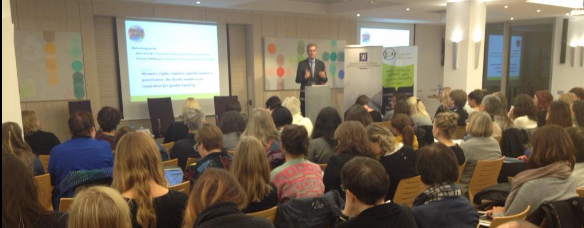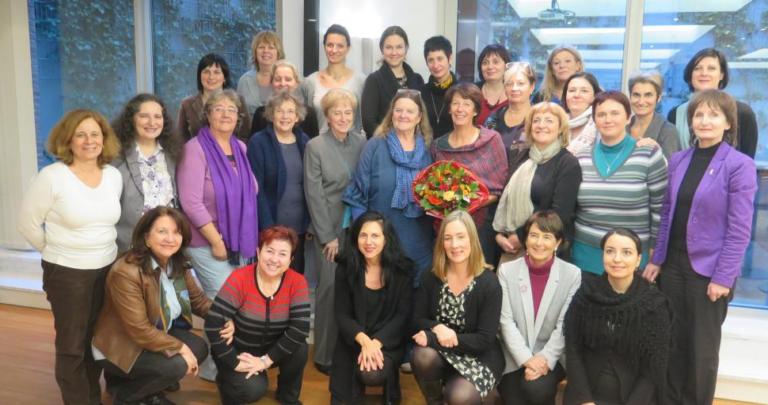[Brussels, 17 December 2010] The need for a strong and effective EU human rights policy, which ensures greater consistency among all EU external policies, is the key message of Parliament’s first human rights report since the Lisbon Treaty entered into force, approved on Thursday. MEPs criticize the human rights records of, inter alia, China, Russia, Iran and Cuba.
With the EU External Action Service now in place, Parliament’s rapporteur Laima Liucija Andrikien? (EPP, LT) called on the EU foreign policy High Representative/Vice-President of the Commission Catherine Ashton to ensure that human rights and democracy-building become “the silver thread running through all external policy areas” and that “human rights do not disappear from the structure”.
A special human rights directorate should be put in place to ensure that human rights are at the heart of the EU’s external actions, and a Special Representative for human rights should be appointed and given a clear mandate, MEPs add.
Overview of provisions on violence against women
The EU and its Member States should use every political means to induce the United Nations to adopt swiftly a resolution for a worldwide moratorium on female genital mutilation, says Parliament’s resolution.
MEPs strongly condemn the use of rape as an instrument of war and the recurrent mass rapes in the Democratic Republic of Congo. They ask for full details of the reasons for the MONUSCO UN peacekeeping force’s inability to stop mass rapes.
Extracts of the provisions on violence against women – NB: emphasis added
69. Notes that the programme of the Trio Presidency of France, the Czech Republic and Sweden (July 2008 – December 2009) gave priority to the question of violence against women and girls, and asks for coherence on principles and policies both outside and inside the EU, including with respect to supporting a ban on female genital mutilation as a human rights violation; notes the recent adoption of a new set of guidelines on the matter and expects the Commission to present the results of its implementation to Parliament;
70. Takes account of the new European Commission’s gender equality strategy’s referring specifically to the issue of female genital mutilation; reiterates the need for coherence on EU internal and external policies regarding this particular issue; urges the European Commission and the EU Member States to address the issue of female genital mutilation in the framework of political and policy dialogues with partner countries and stakeholders relevant to this sensitive issue in the national context, using a participatory approach and involving affected communities; calls on the Commission, the Council and the Member States to activate all political and institutional means in order to support initiatives aiming at the adoption as soon as possible of a resolution by the UNGA calling for a worldwide moratorium on female genital mutilation;
71. Considers that violence against women is also expressed psychologically; observes that in the field of work women remain underpaid in comparison with men and that more of them are employed in precarious or part-time jobs; stresses therefore that the role of the Commission and Member States in this field, both within and outside the European Union, cannot be confined to combating violence in the narrow sense, given the need to combat violence against women in all its forms – physical, psychological, social and economic – and that priority should be assigned to education free of gender bias for boys and girls from the earliest age and to combating gender stereotypes;
72. Underlines the importance of comprehensive implementation of the UN Security Council resolutions 1325, 1820, 888 and 1889 calling for the participation of women in all phases and at all levels of conflict resolution and the protection of women and girls from sexual violence and discrimination; calls on Member States that do not yet have a National Action Plan for the implementation of the UNSCR 1325 to adopt one as a matter of urgency; strongly condemns rape used as an instrument of war and the recurrent mass rapes occurring in DR Congo; requests full disclosure on the incapacity of the MONUSCO peacekeeping force to put a stop to mass rapes; urges the EU HR/VP, through EUSEC and EUPOL in DRC, to conduct an enquiry and report to the EP on all Congolese and international companies or entities involved in the extractive industries in DRC which pay armed groups and security personnel involved in such mass rapes and other systematic crimes against civilians;
73. Calls on the HR/VP to increase the number of staff working on gender issues in external action and to create dedicated structures; recognises the progress made in CSDP in both missions and staff training;
74. Expresses its deep concern about the entrenched gender-based discrimination and domestic violence in several countries, and points out that women living in rural areas are a particularly vulnerable group; similarly, is greatly concerned about cases of sexual violence and high rates of rape of women and girls in South Africa, investigations often being inadequate and obstructed by gender bias, with victims facing numerous obstacles in accessing healthcare and delays in the provision of medical treatment; strongly condemns violence against women and girls as a chronic problem in Guatemala and Mexico;
75. Is deeply concerned about the situation of women and girls in Iran, DRC, Afghanistan; condemns brutal violations of womens‘ rights in DRC, urges the international community to significantly increase funds aimed at efforts to protect women from rape, and stresses that major international attention must be given as a matter of urgency to the situation of women and girls in the DRC; condemns the Shia Personal Status Law adopted in March 2009, which strongly violates the rights of Afghan women and contradicts the Afghan Constitution and international human rights standards; welcomes amendments made to the law on ’Personal Affairs of the Followers of Shia Jurisprudence‘ but remains deeply concerned about certain articles of the law, which contradict the obligations of Afghanistan under the International Covenant on Civil and Political Rights, the Convention on the Elimination of All Forms of Discrimination against Women, and the Convention on the Rights of the Child; urges the Afghan authorities to take action without delay to improve the situation of women’s rights in the country;
76. Insists that women’s rights be explicitly addressed in all human rights dialogues, and in particular the combating and elimination of all forms of discrimination and violence against women and girls, including, most prominently, gender-selected abortion, all forms of harmful traditional or customary practices, for example female genital mutilation and early or forced marriage, all forms of trafficking in human beings, domestic violence and femicide, exploitation at work and economic exploitation, and likewise insists that the invocation by states of any custom, tradition, or religious consideration of any kind, in order to evade their duty to eliminate such brutality, be rejected; emphasises that efforts to eliminate all forms of female genital mutilation should be intensified both at the grass-roots level and within the policy-making process, so as to highlight the fact that such mutilation is both a gender issue and a human rights violation relating to physical integrity; underlines the situation of immigrant young women who, due to the principles of certain communities, religion, or family honour, have to face mistreatment, honour killings or genital mutilation and are being deprived of their freedom;
77. Recalls the Millennium Development Goals, and stresses that access to education and health are basic human rights; believes that health programmes, including sexual and reproductive health, promotion of gender equality, empowerment of women and rights of the child should be prominent in the EU´s development and human rights policy, in particular where gender-based violence is pervasive and women and children are put at risk of HIV/AIDS, or denied access to information, prevention and/or treatment; calls on the Commission to integrate core labour rights and the decent work agenda into its development policy, in particular in trade-related assistance programmes;
78. Welcomes the UN Human Rights Council resolution of 16 June 2009 on preventable maternal mortality and morbidity and human rights, which calls for urgent action in line with the Millennium Development Goals to prevent women from dying needlessly in pregnancy and childbirth; notes that the resolution was supported by the EU Member States, and calls on them effectively to promote the protection of the human rights of women and girls, in particular their rights to life, to be equal in dignity, to education, to be free to seek, receive and impart information, to enjoy the benefits of scientific progress, to freedom from discrimination, and to enjoy the highest attainable standard of physical and mental health, including sexual and reproductive health;
79. Calls on the Council, the Commission and the Member States to promote in particular the ratification and implementation by African Union Member States of the African Union Protocol on the Rights of Women in Africa;
Background
Parliament’s report is a response to the EU Report on Human Rights and Democracy in the World presented by the High Representative Catherine Ashton at the June plenary session in Strasbourg. It covers the period between July 2008 and December 2009. From 2010 onwards, the report will cover the previous calendar year.
For the first time, Parliament’s report includes also two annexes with a list of individual cases raised as well as the resolutions adopted by the European Parliament during the reporting period.
Adopted text will be available here (click on 16 December): http://www.europarl.europa.eu/activities/plenary/ta/calendar.do?language=EN



